Sustainable site planning for new launch facilities at spaceports
IF 3.1
2区 物理与天体物理
Q1 ENGINEERING, AEROSPACE
引用次数: 0
Abstract
The求助全文
约1分钟内获得全文
求助全文
来源期刊

Acta Astronautica
工程技术-工程:宇航
CiteScore
7.20
自引率
22.90%
发文量
599
审稿时长
53 days
期刊介绍:
Acta Astronautica is sponsored by the International Academy of Astronautics. Content is based on original contributions in all fields of basic, engineering, life and social space sciences and of space technology related to:
The peaceful scientific exploration of space,
Its exploitation for human welfare and progress,
Conception, design, development and operation of space-borne and Earth-based systems,
In addition to regular issues, the journal publishes selected proceedings of the annual International Astronautical Congress (IAC), transactions of the IAA and special issues on topics of current interest, such as microgravity, space station technology, geostationary orbits, and space economics. Other subject areas include satellite technology, space transportation and communications, space energy, power and propulsion, astrodynamics, extraterrestrial intelligence and Earth observations.
 求助内容:
求助内容: 应助结果提醒方式:
应助结果提醒方式:


